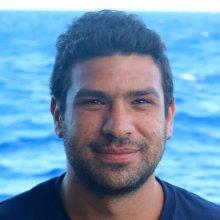
Benjamin Grassian
Tell us about your work/research. What kinds of things do you do?
I use remote sensing (imaging and acoustic) platforms to characterize biological communities and associated processes in the midwater environment. My work centers on developing tools to derive relevant information from these systems to interrogate the complex linkages between local hydrography and organismal habits in a region of the ocean that is traditionally difficult to sample.
What sparked your initial interest in your career?
I have always been passionate about the natural world and the oceans especially. In grade school, I had a hunch I wanted to pursue a career in the sciences, but I also enjoyed creative and artistic pursuits. Before my senior year of high school, I took a year off to join a cell biology research group. This early lab experience taught me that science is, in fact, a highly creative discipline. The process of making and testing assumptions about the workings of the world was the most relevant and rewarding philosophy I had encountered. Ever since I have been driven to pursue the research topics I am most passionate about and address questions I find important to ask.
Who influenced you or encouraged you the most?
After undergraduate, I worked closely alongside a coral reef ecologist who is a wonderful intellectual, naturalist, and mentor. He played a big role in encouraging me to continue in academia. He taught me that making forward progress in science isn’t just becoming more narrowly specialized; that expanding your experiences, guiding questions, and skills are valuable and viable. My work with him also showed me that you don’t have to be a hardened expert to contribute significantly to a field of work, you just need to be invested and curious. Every research group I have been a part of has motivated and encouraged me in my academic and career pursuits in some way.
What element of your work/study do you think are the most fascinating?
That, through in situ data, I get to explore a world that is rarely seen.
What other jobs led you to your career?
Prior to graduate school, I’ve been able to participate in diverse research settings, which helped me figure out the fields that are most intriguing to me. My time working with an in situ plankton imaging system as part of an ichthyoplankton research group most led me towards my current path. It was edifying to see how these new sampling platforms are revolutionizing observational oceanography and our ability to understand the dynamics of life in the oceans. This experience solidified my interest in the oceanographic sciences and I aimed to gain a strong interdisciplinary skill set to best engage these works.
What are your degrees and certifications?
Bachelor of Science in Biology and Marine Science -- University of Miami 2013
What are your hobbies?
I enjoy playing tennis, squash, swimming, and snorkeling/ diving. In the past few years, I have also gotten pretty into painting miniatures, which might be some after-effect of having learned to enjoy microscope work.
What advice would you give someone who wants to have a career like yours?
Any and every opportunity to get involved in a research group is valuable, no matter how small your role may feel initially. Any opportunity can lead to great things if you are passionate about the work. Be patient and persistent in finding your specific path (there is definitely not just one), and let your interests motivate your decisions, rather than fear of challenge or hard work.
How did you get involved with the Nautilus Exploration Program?
My advisor Dr. Chris Roman is involved with the Nautilus mapping operations and I joined in as part of his lab group.
Expeditions
Benjamin participated in the following Ocean Exploration Trust expeditions:
